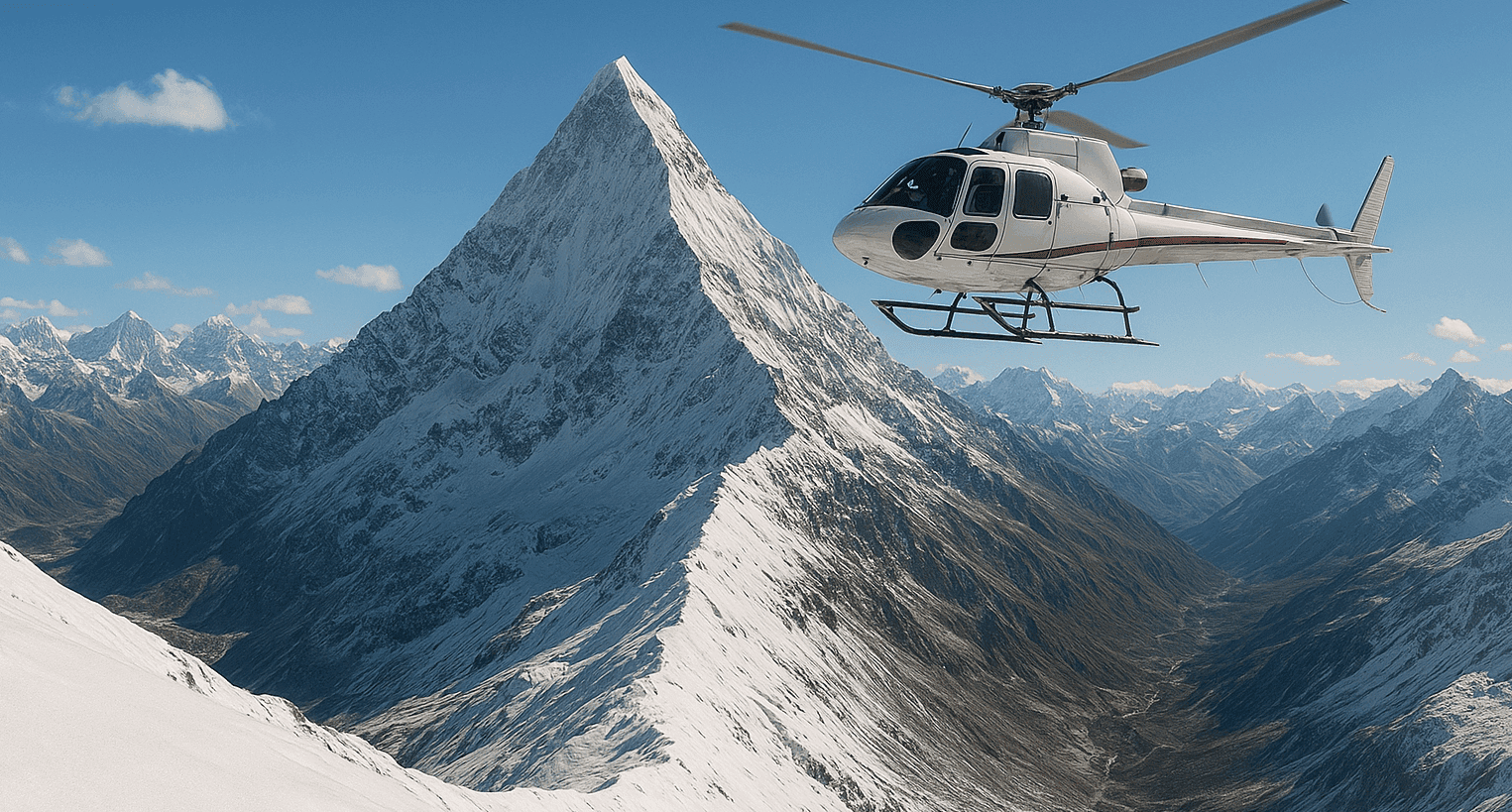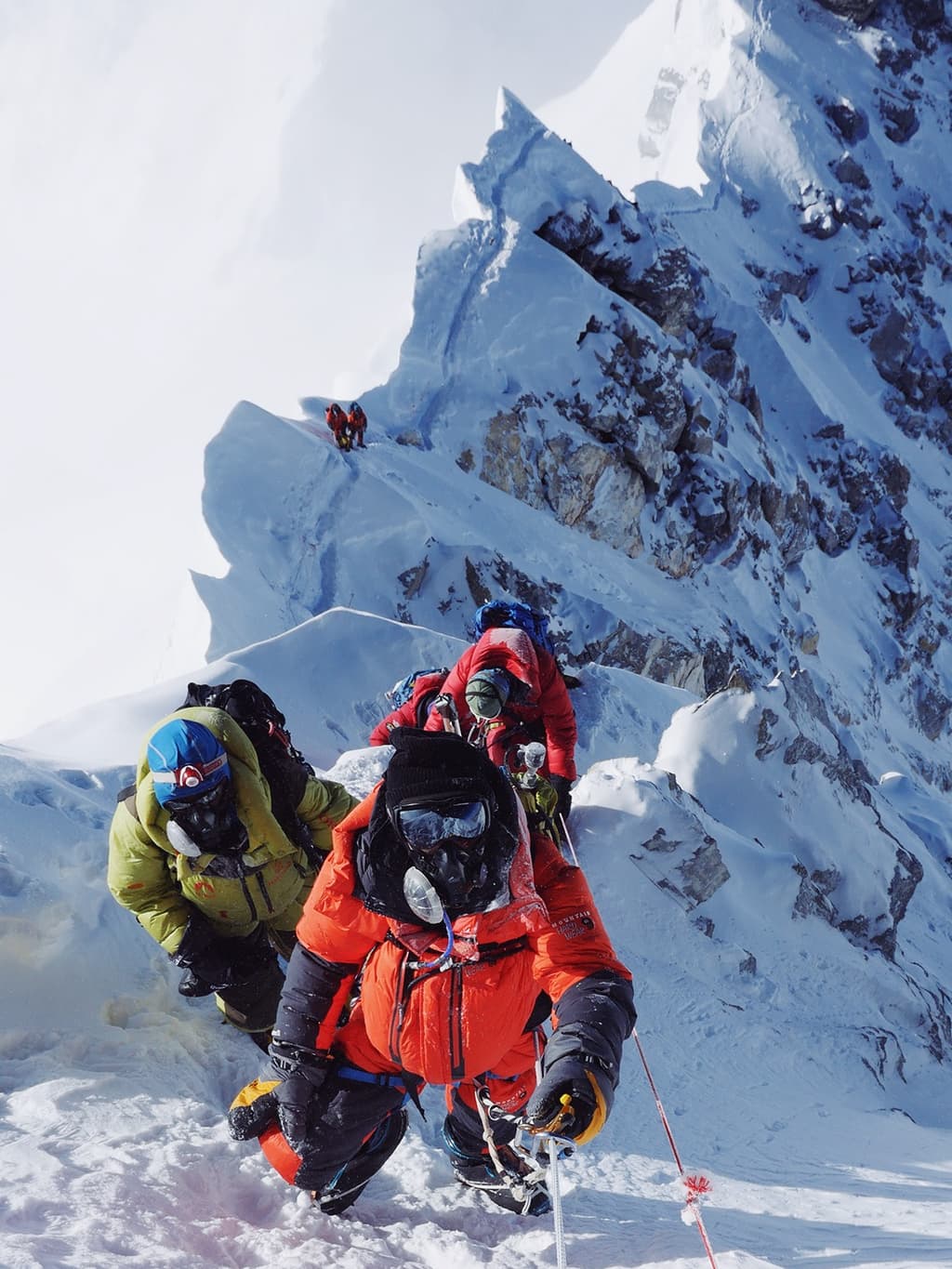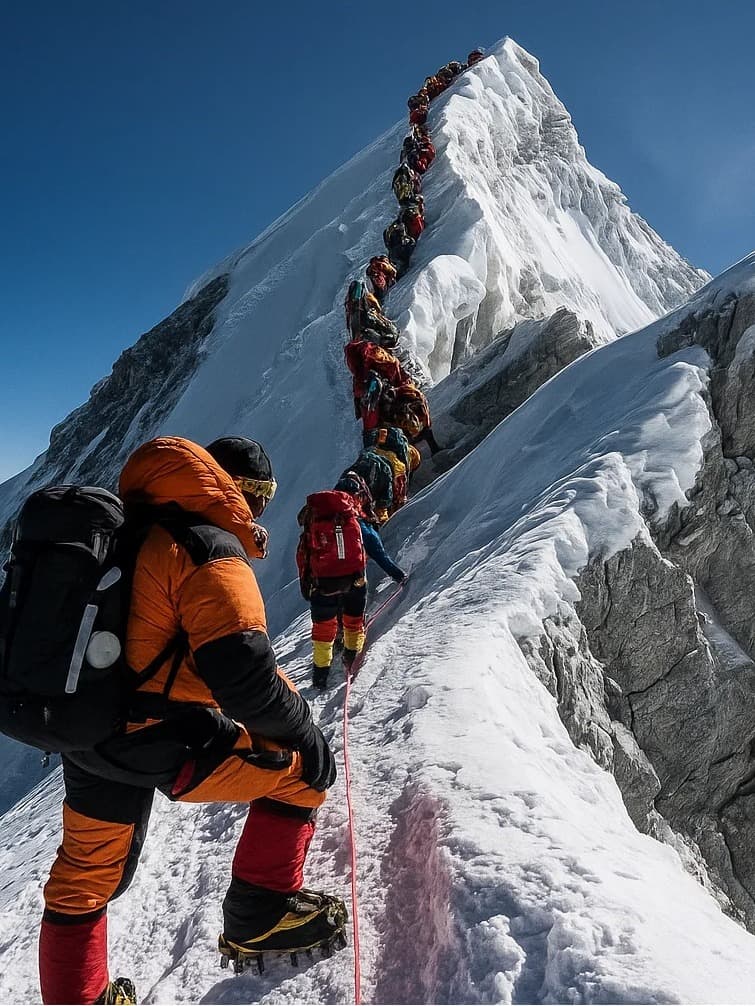Experience the thrill of summiting Island Peak (Imja Tse) at 6,189 meters and skip the long trek back with our exclusive helicopter return package. Perfect for adventurous climbers who want to maximize their Himalayan experience without spending extra days on the return journey.
This expedition is ideal for:
- Moderately experienced climbers with basic mountaineering skills
- Trekkers looking to advance beyond regular hiking to technical climbing
- Time-conscious adventurers who want both the full climbing experience and efficient travel
Our 12-day journey takes you through the stunning Everest region before tackling Island Peak's technical but achievable summit, where spectacular views of Ama Dablam, Lhotse, and surrounding peaks await. After your successful climb, you'll enjoy a scenic helicopter flight from Chhukung to Lukla, cutting days off your return journey.
We'll cover everything from comprehensive gear requirements to physical preparation strategies, ensuring you're fully equipped for this challenging but rewarding Himalayan adventure.
Complete Expedition Overview and Peak Details
Island Peak Location and Elevation Specifications
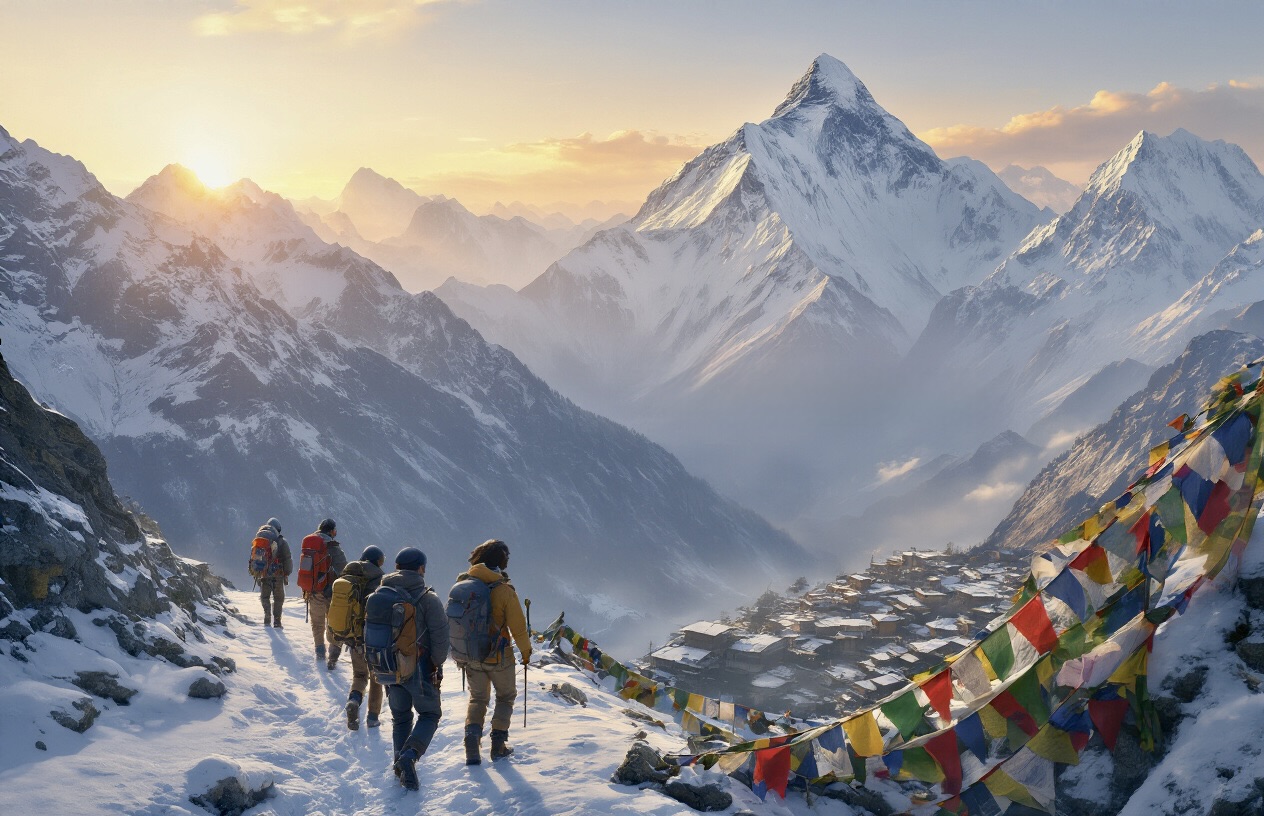
Island Peak, also known by its Nepali name Imja Tse, stands proudly at an elevation of 6,187 meters (20,305 feet) in the magnificent Everest region of Nepal. This impressive mountain is situated close to the Tibetan border within the protected boundaries of Sagarmatha National Park. Its strategic location makes it an integral part of the Himalayan landscape, offering climbers an authentic Himalayan experience while being accessible enough for moderately experienced mountaineers.
Technical Climbing Requirements and Difficulty Assessment
Island Peak is classified as a moderately difficult technical climb that requires specific skills and preparation. Climbers should possess:
- Physical fitness appropriate for high-altitude exertion
- Preferably some previous climbing experience or high-altitude training
- Basic mountaineering skills including the use of crampons and ice axe
- Knowledge of rope techniques for glacier travel and steep sections
The biggest challenge climbers face is typically the high altitude rather than extreme technical difficulty. Safety measures including fixed ropes along the route contribute to making the ascent relatively safe for prepared climbers. The reward for this effort is substantial—from the summit, climbers enjoy breathtaking views of iconic Himalayan peaks, including Mt. Ama Dablam, Lhotse, and Mera Peak.
Helicopter Return Innovation and Modern Convenience Benefits
Our expedition introduces a modern approach to traditional Himalayan climbing with our helicopter return option. After successfully conquering Island Peak, climbers can enjoy a luxurious helicopter flight from Chhukung directly back to Lukla. This innovative service provides several key advantages:
- Eliminates the need for the traditional multi-day return trek
- Significantly reduces the overall expedition time
- Offers a more comfortable journey after the physical demands of summit day
- Provides a unique aerial perspective of the Himalayan landscape
- Adds a touch of luxury to your mountaineering achievement
Best Seasons for Climbing Success
For optimal climbing conditions on Island Peak, timing is crucial. The expedition is best undertaken during two primary seasons:
- Pre-monsoon (Spring): April to May
- Post-monsoon (Autumn): September to November
These seasonal windows typically offer the most stable weather patterns in the Himalayan region, with clearer skies and more predictable conditions. During these months, climbers benefit from better visibility for summit views and generally more favorable climbing conditions, maximizing both safety and the overall experience.
Detailed Day-by-Day Itinerary Breakdown
Arrival and Preparation in Kathmandu
Your Island Peak expedition begins with your arrival in Kathmandu (1,300m/4,428ft), where our representative will greet you and arrange your transfer to a comfortable hotel in the vibrant Thamel district. Take advantage of this first day to settle in, explore the local area, and complete any last-minute shopping for trekking essentials. In the evening, you'll meet with your experienced guide for a comprehensive trek briefing, covering important details about the journey ahead and addressing any questions you might have.
Flight to Lukla and Trek to the Everest Base Camp Region
Day 2 marks the start of your mountain adventure with an early morning scenic flight from Kathmandu to Lukla (2,800m/9,184ft). After landing at this mountain airstrip, you'll begin your trek, covering a 5-6 hour journey to Phakding (2,652m/8,700ft). The trail takes you through charming villages, including Tok-Tok, Benkar, and Monjo, with multiple crossings over suspension bridges spanning the Dudh Kosi River.
On Day 3, you'll continue to Namche Bazaar (3,440m/11,283ft), crossing the famous Hillary suspension bridge before tackling a challenging uphill climb to reach this bustling Sherpa trading hub. This trek segment offers your first glimpses of the magnificent Himalayan landscapes that define the region.
Strategic Acclimatization Days and Training Sessions
Proper acclimatization is crucial for a successful and safe expedition. Day 4 is dedicated to acclimatization in Namche Bazaar, where you'll have options to trek to the traditional villages of Khunde and Khumjung for spectacular views of Mt. Everest, or simply explore Namche and adjust to the altitude.
The journey continues with careful elevation gain as you trek to Tengboche (3,870m/12,694ft), then Dingboche (4,360m/14,300ft), and finally Chhukung (4,730m/15,518ft). Another vital acclimatization activity includes hiking to Chhukung Ri (5,546m), which not only helps your body adapt to higher elevations but also rewards you with breathtaking panoramic views.
The final approach involves a steep trail leading to Island Peak Base Camp (5,200m/17,060ft), where you'll prepare for your summit attempt with essential training and rest.
Summit Day Execution and Helicopter Evacuation

Summit day (Day 10) begins with an early morning start, typically around 1-2 AM. The climb to Island Peak Summit (6,187m) is technically challenging, requiring navigation across rocky terrain and ridges while enjoying spectacular glacier views. Your experienced guides will assist with safety equipment and techniques throughout the ascent.
After celebrating your summit achievement, you'll descend to Chhukung, where a unique feature of this expedition awaits – a sharing helicopter service back to Lukla, eliminating days of trekking on tired legs. You'll spend the night in Lukla, reflecting on your accomplishment.
The expedition concludes with an early morning flight from Lukla back to Kathmandu on Day 11, followed by a final night in the capital. Day 12 marks the end of your adventure with a transfer to Kathmandu International Airport for your departure flight.
Essential Permits and Documentation Requirements
Island Peak Climbing Permit Specifications
To embark on the Island Peak climb, you must secure a climbing permit through a registered trekking agency in Nepal. This is a mandatory requirement for all climbers, regardless of experience level. The permit fees vary depending on the season of your climb and your nationality, with different rates applying to different times of the year. Our agency, Everest Sherpa Expeditions Pvt. Ltd., handles all permit processing on your behalf, ensuring you have the proper documentation before beginning your adventure.
Sagarmatha National Park Entry Requirements
Since Island Peak is situated within the Sagarmatha National Park, a UNESCO World Heritage Site, you'll need to obtain a Sagarmatha National Park entry permit. This permit is essential for all trekkers and climbers entering the park boundaries. Additionally, you must pay the Khumbu Pasang Lhamu Rural Municipality fees, which contribute to local conservation efforts and community development in the region. These permits help regulate visitor numbers and maintain the pristine condition of this ecologically sensitive area.
TIMS Card and Additional Permit Processing
A TIMS (Trekkers' Information Management System) card is another crucial document required for your Island Peak expedition. This system helps track trekkers in the region for safety purposes and assists authorities in monitoring tourism activities in the area. Our agency will process this card along with all other necessary permits, streamlining the documentation process so you can focus on preparing for your climb rather than navigating bureaucratic procedures.
Group Discount Options and Booking Procedures
For those traveling in groups, we offer attractive discount options on permit processing fees. These group discounts can significantly reduce the overall cost of your expedition, making it more affordable for teams and friends climbing together. The booking procedure for permits is handled entirely by our experienced team at Everest Sherpa Expeditions. We recommend booking your climb and initiating the permit process at least two months in advance to ensure smooth processing and avoid any last-minute complications that could affect your climbing schedule.
Comprehensive Equipment and Gear Guidelines
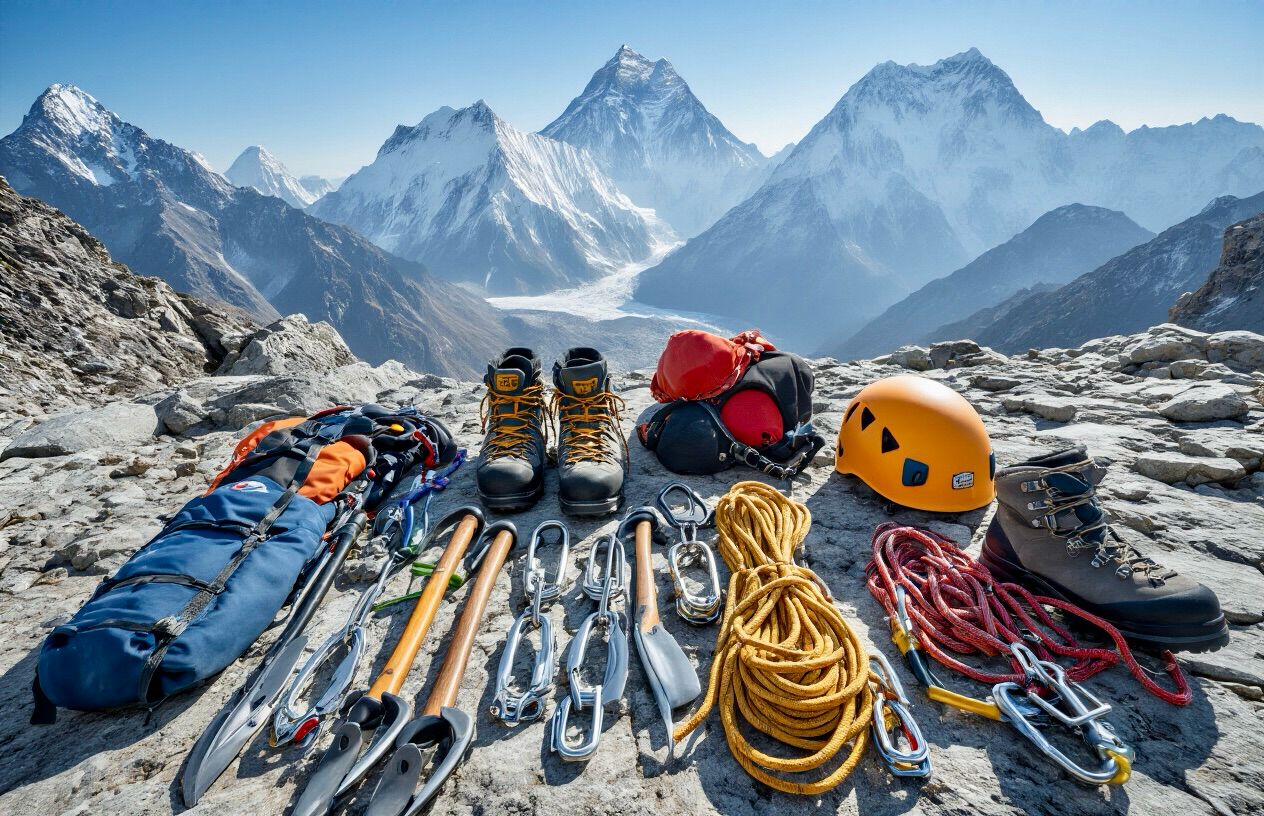
Upper Body Technical Climbing Equipment
For a successful Island Peak expedition, proper upper-body gear is critical. Your layering system should begin with moisture-wicking and quick-drying base layers that keep sweat away from your skin. Over this, pack fleece or down insulation layers that provide warmth without excessive weight. A durable waterproof shell jacket is essential for protection against unpredictable mountain weather, while a lightweight softshell jacket offers flexibility during active climbing sections.
Technical climbing equipment includes a comfortable climbing harness for rope work and a strong helmet to protect against falling debris. For your hands, bring lightweight liner gloves for dexterity during technical sections and insulated gloves or mittens for extreme cold conditions. Don't forget a buff or neck gaiter to protect your neck and face from harsh winds and cold.
Eye protection is crucial at high altitudes – pack polarized UV-protected sunglasses for daytime and ski or mountaineering goggles for windy or snowy conditions.
Lower Body Mountaineering Gear Requirements
Your lower body gear should start with moisture-wicking and quick-drying thermal bottoms as a base layer. Add fleece or insulated pants for mid-layer warmth and durable waterproof shell pants to shield against precipitation and wind. Lightweight softshell pants are ideal for active climbing in milder conditions.
Footwear is perhaps the most critical component of your lower-body gear. Invest in sturdy, insulated mountaineering boots compatible with crampons. Your boots must provide adequate insulation, ankle support, and a rigid sole for technical climbing sections. Attachable crampons are essential for navigating icy terrain safely.
Waterproof gaiters will keep snow out of your boots, while a combination of moisture-wicking liner socks and thick mountaineering socks will keep your feet dry and warm during long climbing days.
Safety Equipment and Emergency Supplies
Safety is paramount on Island Peak. Carry a spacious backpack (40-50 liters) that can accommodate all your gear while allowing easy access to essential items. A warm and lightweight sleeping bag rated for extreme temperatures is essential for rest at high camps.
Adjustable trekking poles help with balance and reduce strain on knees during the approach trek. Always have a headlamp with extra batteries for early morning summit pushes and emergencies. Insulated water bottles prevent freezing at high altitudes, and high SPF sunscreen protects against intense UV radiation.
A comprehensive first aid kit should include medications for altitude sickness, pain relief, bandages, and blister treatment. Don't underestimate the importance of climbing snacks like energy bars and nuts to maintain energy levels during the ascent.
Rental Options and Equipment Procurement in Nepal
Sherpa Expedition & Trekking provides essential group equipment, including base camp tents, room accessories, climbing rope, ice screws, snow bars, and ice hammers. They also offer sleeping bags, down jackets, duffel bags, and walking poles for use during the expedition, which must be returned after the trip.
If you prefer not to bring all your gear from home, climbing equipment rental is available in Nepal. Kathmandu offers the most comprehensive selection of rental shops, with some options also available in Lukla. However, for personal items that require a perfect fit—such as boots, harnesses, and clothing—bringing your own gear is highly recommended for comfort and reliability during this challenging climb.
Complete Service Inclusions and Package Benefits
Transportation and Accommodation Arrangements
Our Island Peak Climb package ensures your comfort throughout the journey with comprehensive transportation and accommodation services. You'll enjoy private car/jeep airport pickups and transfers in Kathmandu, along with two nights of standard twin-sharing hotel accommodation with breakfast included. During the trek portion, we provide comfortable lodging in traditional trekking lodges (tea houses). The climbing session features secure tent camp accommodation for your safety and comfort.
A key highlight of our package is the shared helicopter service from Chhukung to Lukla, offering a spectacular aerial view while saving you valuable time and energy. We also include all flights between Kathmandu and Lukla (or Ramechhap and Lukla) with private airport transfers and all domestic airport taxes covered.
Professional Guide and Sherpa Support Services
Your expedition will be led by highly experienced, knowledgeable, and friendly English-speaking government-licensed guides who ensure your safety and enrich your journey with local insights. Their salary, food, drinks, accommodation, transport, and insurance are fully covered in your package price.
Strong and helpful Sherpa porters equipped with proper safety and walking equipment will accompany you (one porter for every two trekkers) to carry your heavy gear. For larger groups of 8 or more people, we provide an assistant guide to maintain our high standards of service and safety throughout the expedition.
Medical Support and Emergency Helicopter Coverage
Your health and safety are our priority. Our package includes comprehensive medical supplies through a well-stocked first aid kit. We also arrange emergency helicopter service if needed, which would be covered by your travel insurance company.
To monitor for Altitude Mountain Sickness (AMS), we equip our team with an oxygen meter to check their pulse, oxygen saturation, and heart rate twice daily, allowing for early detection of potential altitude-related issues.
Meals and Mountain Lodge Facilities
Nutritious meals are essential for a successful climb. Our package includes three meals a day (breakfast, lunch, and dinner) throughout the trek, with fresh fruit provided every evening to boost your energy and immune system. All meals are carefully prepared to provide the necessary nutrition for the physical demands of high-altitude trekking and climbing.
Additionally, we provide the use of sleeping bags, down jackets, duffel bags, and walking poles if you don't have your own, ensuring you're properly equipped without the need to purchase expensive gear. Upon successful completion of your adventure, you'll receive a trip achievement certificate as a memento of your accomplishment, along with the satisfaction of knowing all government taxes and official expenses have been properly handled.
Package Exclusions and Additional Costs
International Travel and Visa Requirements
While our Island Peak Climb package offers comprehensive services, several international travel components remain your responsibility. International airfare to and from Nepal is not included in the package price. Additionally, you'll need to arrange your Nepal entry visa, which is obtainable upon arrival at Tribhuvan International Airport. The visa fees are structured as follows:
- 15-day visa: $30 USD
- 30-day visa: $50 USD
- 90-day visa: $125 USD
Personal Expenses and Optional Activities
During your expedition, numerous personal expenses fall outside our package coverage. These include:
- Meals in Kathmandu (specifically lunch and dinner)
- All alcoholic and non-alcoholic beverages
- Soup, tea, coffee, hot chocolate, and cocoa
- Mineral water and extra food
- Cold and hot drinks purchased during the trek and at tea houses
- All desserts and sweet items (chocolate, cake, pie, pudding)
- Hot showers at tea houses
- Battery charging services
Insurance and Medical Coverage Responsibilities
Personal travel and medical insurance are not included in our package and remain your responsibility. This insurance is essential as it covers potential emergencies, medical evacuations, and treatment costs. Please note that if you need to return early from the trek due to sickness or other problems, any paid money for flights, hotels, mountain accommodations, food, etc., is non-refundable, and you will bear all personal expenses for hotel, food, etc., in Kathmandu.
Tipping Guidelines and Extra Service Fees
Tipping is customary and expected for services provided by guides, porters, and drivers. While the amount is discretionary, we recommend preparing an appropriate budget for these gratuities to acknowledge the hard work of our team members.
Additional service fees to be aware of include excess baggage charges. The Lukla flight has a strict weight limit, and any baggage exceeding 10 kg will incur extra fees that are not covered in our package price.
Physical Preparation and Safety Considerations
Fitness Requirements and Training Recommendations
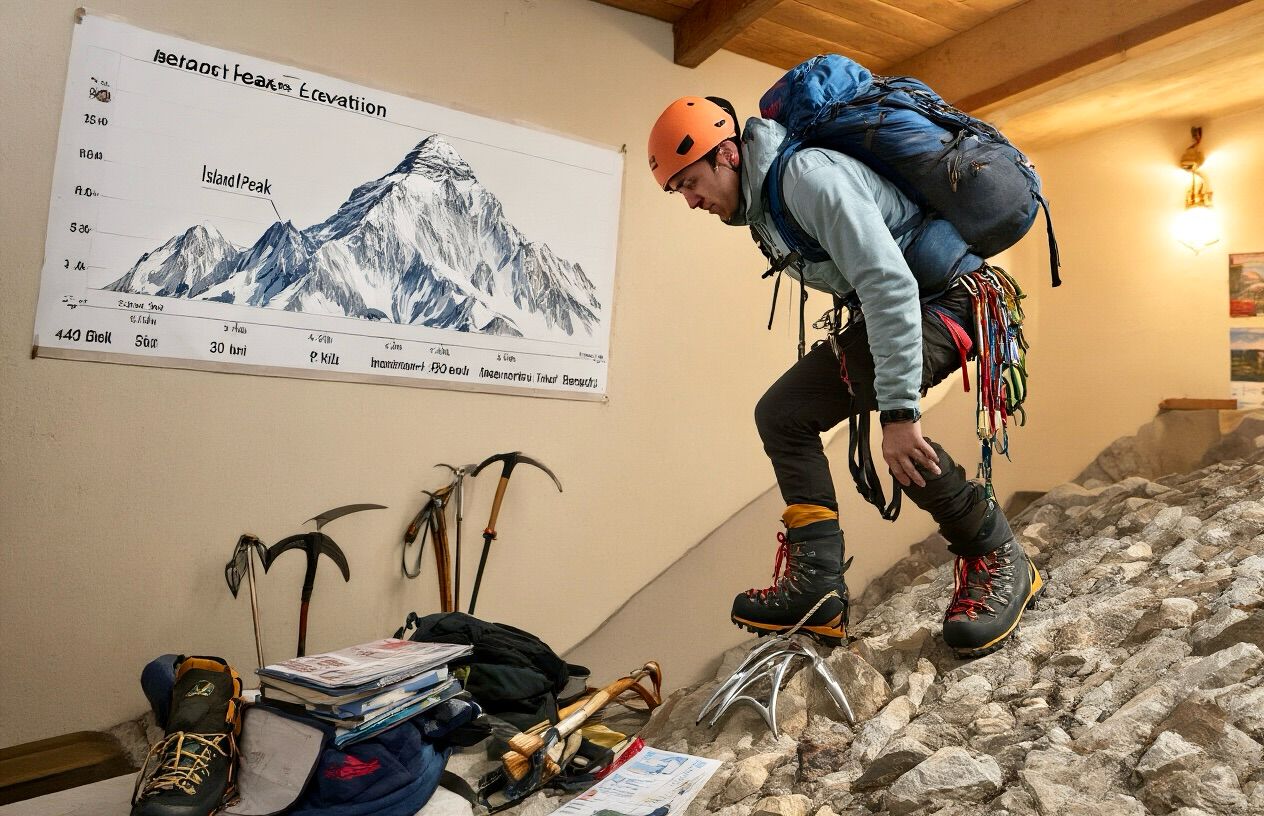
Physical fitness and endurance play a crucial role in successfully climbing Island Peak. To prepare your body for this challenging adventure, we recommend a comprehensive training regimen that includes:
- Regular cardiovascular exercises (running, swimming, cycling)
- Strength-building activities focusing on core and leg muscles
- Endurance training to build stamina for long climbing hours
- Hiking with a loaded backpack to simulate climbing conditions
The better prepared you are physically, the more you'll enjoy the experience rather than simply enduring it.
Altitude Sickness Prevention and Management
Altitude sickness is a significant concern when climbing to high elevations like Island Peak. Proper management includes:
- Crucial acclimatization: Spend a few days in the Everest region before attempting the climb
- Progressive altitude exposure: Trek to higher altitudes gradually before the actual climb
- Hydration: Maintain proper fluid intake throughout your journey
- Monitoring: We check your pulse, oxygen saturation, and heart rate twice daily using an oxygen meter
- Early detection: Our guides are trained to recognize Altitude Mountain Sickness (AMS) symptoms
Following your guide's advice regarding pace and rest is essential to minimize altitude-related risks.
Technical Skills Development and Experience Prerequisites
While not mandatory, prior climbing experience is highly recommended for Island Peak. This technical climb requires:
- Basic mountaineering skills
- Familiarity with using crampons and an ice axe
- Rope techniques knowledge
- High-altitude trekking experience for a safer and more enjoyable climb
We recommend practicing these skills before your expedition to ensure you're comfortable with the technical aspects of the climb.
Emergency Protocols and Risk Management
Your safety is our priority during the Island Peak expedition:
- Regular health monitoring using oxygen meters
- Comprehensive risk assessment by experienced guides
- Emergency helicopter service availability if needed (covered by your travel insurance)
- Clear evacuation protocols in case of emergencies
- Expert guides trained in mountain rescue techniques
Always prioritize safety over summit success. Our experienced guides will make critical decisions based on weather conditions, your physical condition, and overall safety considerations.
Frequently Asked Questions and Expert Guidance
Climbing Difficulty and Experience Requirements
Island Peak is categorized as a moderately difficult climb, making it suitable for adventurers with varying experience levels. While the climb does not demand extensive mountaineering expertise, you should be familiar with basic mountaineering techniques. These include proficient use of crampons, ice axe handling, and fundamental rope techniques for safety during the ascent.
Though prior climbing experience is not strictly mandatory, we strongly recommend having some basic mountaineering skills and high-altitude trekking experience before attempting Island Peak. This preparation will significantly enhance your safety and enjoyment of the expedition. Physical fitness is also crucial for tackling the challenges of high-altitude climbing and the demanding terrain you'll encounter.
Permit Processing and Documentation Timeline
Before embarking on your Island Peak adventure, several permits are required. The primary documentation is the climbing permit for Island Peak, which can only be obtained through a registered trekking agency in Nepal like Everest Sherpa Expeditions. The cost of this permit varies depending on your nationality and the season of your climb.
In addition to the climbing permit, you'll need to secure a Sagarmatha National Park entry permit and a TIMS (Trekkers' Information Management System) card. Both of these documents can also be arranged through our agency as part of your expedition package. We recommend initiating the permit process well in advance of your planned climb to ensure all documentation is in order.
Weather Conditions and Seasonal Considerations
The optimal times to climb Island Peak are during the pre-monsoon (spring) season from April to May and the post-monsoon (autumn) season spanning September to November. These periods offer the most stable weather conditions and clearer views of the spectacular Himalayan landscape.
During these recommended seasons, you'll experience more predictable weather patterns, reduced precipitation, and generally better climbing conditions. The clear skies also provide breathtaking panoramic views of the surrounding peaks, enhancing your overall experience and increasing the chances of a successful summit.
Gear Rental and Equipment Preparation Options
For climbers concerned about equipment, Nepal offers convenient gear rental options. Kathmandu and Lukla are the primary locations where you can rent climbing equipment. This is particularly useful for items that are bulky or that you may not use frequently enough to justify purchasing.
We advise bringing your personal gear, such as appropriate clothing, boots, and other items specific to your comfort and preferences. For specialized climbing equipment like ice axes, crampons, and harnesses, rental options are available if you don't already own these items or prefer not to transport them from your home country. Our team can guide what to bring versus what to rent based on your specific needs and experience level.
The Island Peak Summit expedition with helicopter return offers the perfect balance between adventure and convenience. By combining the challenge of a 6,189-meter technical climb with the luxury of an aerial return journey, this package delivers an unforgettable Himalayan experience. From comprehensive preparation and acclimatization to expert guiding and safety measures, Everest Sherpa Expeditions has designed this journey to be both accessible and rewarding for mountaineers seeking their first major summit.
As you contemplate this remarkable adventure, remember that standing atop Island Peak—looking out at panoramic views of Ama Dablam, Lhotse, and the surrounding Himalayan giants—may inspire you to seek even greater mountaineering challenges. Whether you're drawn by the technical climbing experience, the cultural immersion along the trek, or simply the achievement of conquering your first major Himalayan peak, this expedition offers the perfect introduction to high-altitude mountaineering with the added comfort of a swift return by helicopter. Begin your journey to the "island in a sea of ice" and create memories that will last a lifetime.
If you need any further information, please contact us by email: [email protected], Phone: +977- 980 195 6248 (WhatsApp).
